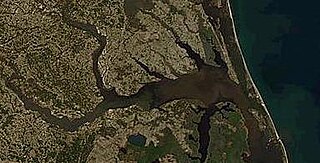
Robert Livingston the Elder was a New York colonial official, fur trader, and businessman; he was granted a patent to 160,000 acres along the Hudson River, and became the first lord of Livingston Manor.
Thomas Jarvis (1623–1694) was the Deputy Governor of the Carolina Province from 1691 to 1694.
John Jenkins was an English soldier who served as governor of Albemarle four times: 1672-1675;1676-1677;1678-1679;1680-1681, becoming the only person who has served as proprietary governor so many times.
Joseph Blake, the nephew of British General at Sea Robert Blake, was governor of colonial South Carolina in 1694, and from 1696 to his death 1700.
Edward Moseley, was the Surveyor General of the Province of North Carolina before 1710 and 1723 to 1733. He was also the first colonial Treasurer of North Carolina, starting in 1715. He was responsible, with William Byrd II of Virginia Colony, for surveying the boundary between North Carolina and Virginia in 1728.
Cary's Rebellion was an uprising against the Deputy Governor of North-Carolina in 1711 led by Thomas Cary, who refused to give up his governorship to Edward Hyde. The rebellion was a part of a long-standing tension between religious and political groups in northern Carolina, generally divided between the Quaker party, of which Cary was a part, and the Church of England party, to which Hyde belonged.

Colonel Joshua Fry (1699–1754) was a surveyor, adventurer, mapmaker, soldier, and member of the House of Burgesses, the legislature of the colony of Virginia. He is best known for collaborating with Peter Jefferson, the father of future U.S. president Thomas Jefferson, on an influential map of Virginia in 1752, and being the immediate predecessor of George Washington as commanding officer of the Virginia Regiment, a key unit in the military developments that led to the outbreak of the French and Indian War.
John Archdale served as British colonial Governor of North Carolina and Governor of South Carolina in 1695 and 1696. He may have also been appointed to serve circa 1683-1686. Archdale was appointed to the position by the Lords Proprietors of Carolina.

Colonel Thomas Brooke Jr. of Brookefield was President of the Council in Maryland and acting 13th Proprietary Governor of the Province of Maryland. He was the son of Major Thomas Brooke Sr. and Esquire, (1632–1676) and his second wife Eleanor Hatton, (1642–1725), who later remarried Col. Henry Darnall, (1645-1711).
James Bishop was an early English colonial administrator of Connecticut.

Francis Howard, 5th Baron Howard of Effingham was a member of the Howard family, descended from noted naval commander Lord High Admiral Howard, and a Crown Governor of Virginia (1683-1692).
Thomas Miller was the acting colonial governor of North Carolina for about six months in 1677 during the absence of the official governor Thomas Eastchurch. During Miller's government, the Anti-Proprietors, led by John Culpeper, provoked the Culpeper's Rebellion.

Elisha Cooke was a wealthy Massachusetts physician, politician, and businessman who was elected Speaker of the Massachusetts House of Representatives in 1683. He was the leader of the "popular party", a faction in the Massachusetts House that resisted encroachment by royal officials on colonial rights embodied in the Massachusetts Charter. This role was taken up by his son, Elisha Cooke Jr.

Sir John Banks, 1st Baronet FRS was an English merchant and MP, who rose from relatively humble beginnings to be one of the wealthiest merchants in London and owner of several properties.

Seth Sothel was a colonial American proprietor and governor of the Province of Carolina. He ruled the northern portion, Albemarle Sound, in 1678 and the southern portion from 1690 to 1692. He died in North Carolina in about 1694.
Henderson Walker (1659-1704) was the Acting Deputy Governor of North Carolina from 1699 to 1704. He is better known for his contribution in the founding of the Church of England in the Albemarle Sound region.
James Graham was an English born colonial American politician who served as the Speaker of the New York General Assembly.








